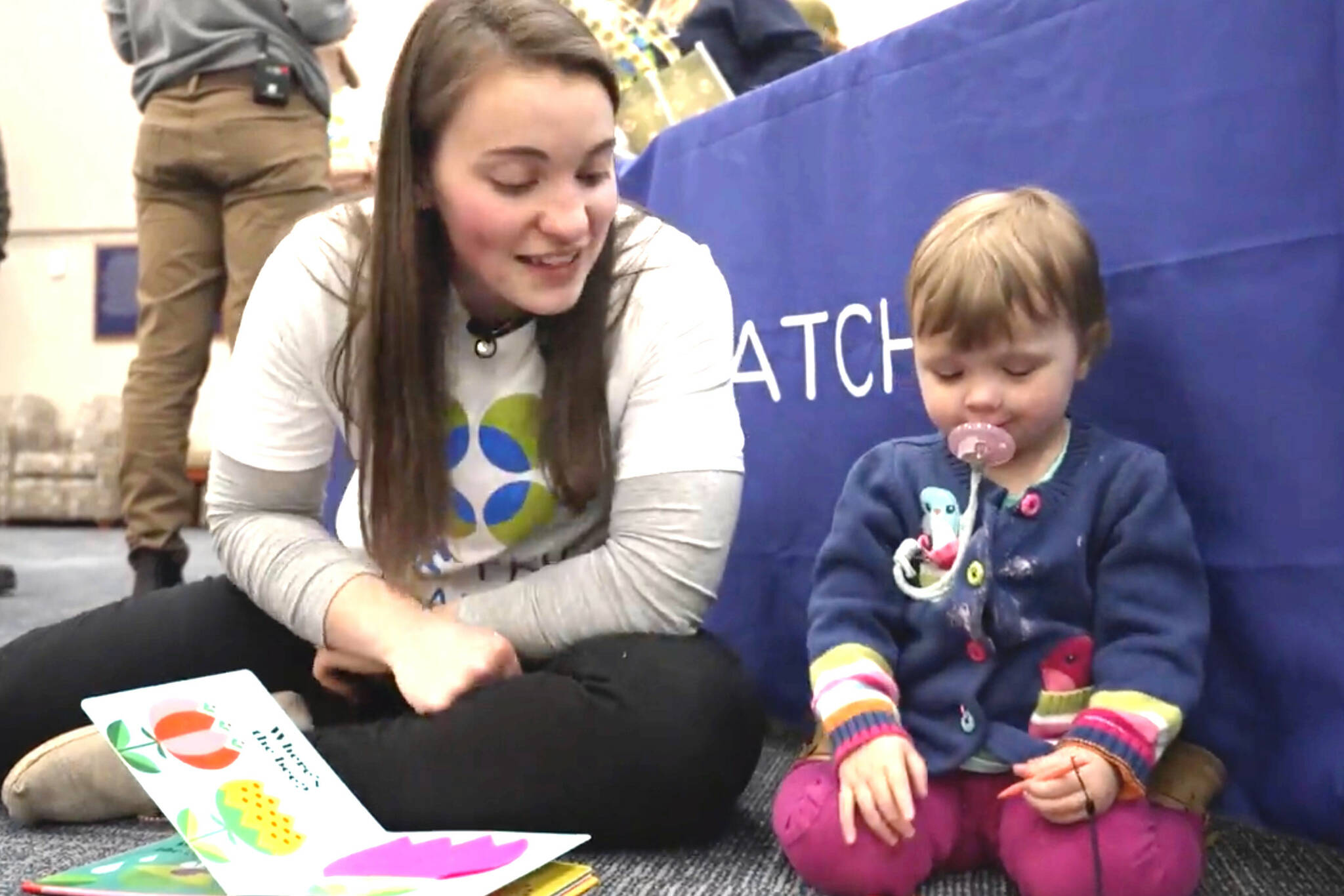Faced with several failed rounds of chemotherapy, things were not looking good for Amelia Bellmore, who was locked in a fight against leukemia before her first birthday.
However, hope for Amelia and her Juneau family would come from a college student at Brigham Young University who had casually registered to provide bone marrow transplants nearly half a decade before, and was a match for the baby.
Now, Amelia is doing better, said her father Ryan Bellmore. Several months ago, the family was able to travel to BYU to meet the woman who saved Amelia’s life.
[Prosecution reconstructs events leading to fatal stabbing]
The cancer diagnoses came in September of 2020, when Amelia was just months old, Ryan said. A troubling bump on Amelia’s face, which defied diagnoses in Juneau, was eventually identified as leukemia.
“It was sort of a long process. They didn’t know she had leukemia when we were here,” Ryan said in a phone interview. “Something just struck me that something’s not right.”
Working with hospitals in the Lower 48, first in Portland, Oregon, and then in Seattle, Amelia made it through several rounds of chemo and radiation therapy before doctors decided to attempt a bone marrow transplant. Ordinarily, Ryan said, they’d reach for a sibling, like Amelia’s older sister, but doctors determined a non-related donor would give Amelia better ods.
“At that point they told us they had found a donor,” Ryan said. “We didn’t know anything about her at the time. They said she was young college-age woman.”
Bueckers, then in college at BYU, said she’d signed up because it was around the corner from her dorm, and having given blood, wasn’t phased by the prospect of giving bone marrow.
“I didn’t think I’d ever have to donate. I’d been on the registry for four or five years and they contacted me and said we had a potential match,” Bueckers said in a phone interview. “It was a little surreal. I didn’t think it would ever be me that matched with someone. I was grateful I was able to be a match and do something helpful and make a difference in someone’s life.”
After the verifying process, Bueckers traveled to Wisconsin to donate the bone marrow in early 2021.
“They make two little incisions and they take a needle and it goes into your bone,” Bueckers said. “I had a super easy recovery. I donated on a Tuesday and by Thursday I was back up on it.”
The process of transfusing the bone marrow is also simple on the other end, Ryan said. While Amelia was up and down for a few months after receiving the transplant, she stabilized and is doing much better now. While the family still needs to go in to Seattle about once a month, the Bellmores were largely able to return to Juneau.
“By the end of April she really turned a corner,” Ryan said. “Now we’re just going to Seattle to get her bone marrow checked and make sure there’s no cancer.”
An emotional meeting
The Be the Match Registry, part of the nonprofit National Marrow Donor Program, runs both the donor registry and organizes the transplant process itself. The organization allows for anonymous contact between the donor and the recipient in the form of letters.
“It just kind of depends on who they donate it to and what they’re comfortable with in the end,” Bueckers said. “I really wanted to make sure things were going well for them.”
Ryan said the letters came as a welcome surprise.
“A couple months after the transplant we received a letter from our donor. I read it and just started crying. It was really emotional. It was such a beautiful letter to Amelia,” Ryan said. “It was like, I hope we get a chance and Amelia gets a chance to meet this woman.”
The Bellmore family traveled down to Utah earlier this year to a Be the Match event, where they were finally able to meet Bueckers
“Shawen is an amazing young woman. We got to meet her. I think Amelia and her hit it off right away. A lot of tears from mom and dad and Shawen,” Ryan said. “We’ve kept in touch with Shawen since then. We’ve Facetimed several times. She’s going to be part of Amelia’s life for a long time.”
Bueckers said it was staggering to see Amelia.
“It’s amazing,” Bueckers said. “It’s so exciting to see her interact and do things that a normal 2-year-old should be doing.”
Registering as a potential donor is a simple process — Ryan said he did so after the transplant was able to help Amelia.
“You can sign up in the mail. They send you an envelope with some cheek swabs and you put those in another envelope and send them back,” Ryan said. “You have to be 40 and under. I think mine just got fully in the database.”
Finding a matching donor can be difficult, Ryan said, with Indigenous and other minority donors being underrepresented in the registry.
“Most people never end up having to donate,” Ryan said. “I think it would be super cool being able to do that. I think there’s a lot of personal satisfaction knowing you saved someone’s life or improved someone’s quality of life.”
Searching for a match
An 8-year-old Anchorage boy, Tiberius Newbill, is currently searching for a match, complicated by his mixed Alaska Native, Black and white heritage, Ryan said.
“Right now, Tiberius is doing a light chemo protocol to keep his cancer below the 5% threshold,” said Amy Adamle, a communications specialist handling outreach for Be the Match. “He technically hasn’t relapsed yet but, his diagnosis makes it almost certain that he will relapse in the future. As of right now, there are not any matches on the registry for Tiberius.”
More information about registering or the program can be found at bethematch.org.
• Contact reporter Michael S. Lockett at (757) 621-1197 or mlockett@juneauempire.com.

